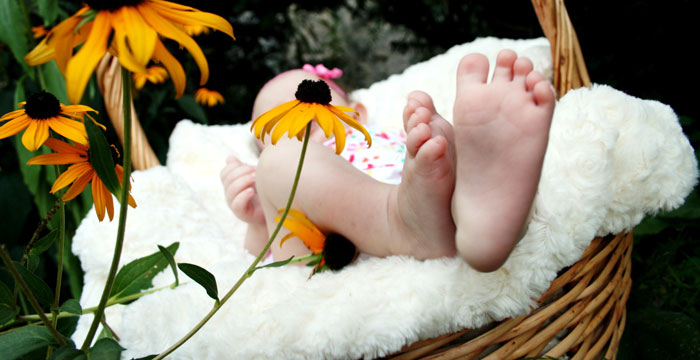
Raising a Zero Waste Baby: Lessons from an Imperfect Mom
I hate stuff.
I hate buying stuff, I hate shopping for stuff, and I hate having a ton of stuff cluttering up my home. We live in a small Philadelphia rowhouse with no attic for storage and tiny closets that don’t even fit a hanger.
In my quest to produce less waste, my hatred of stuff has served me well until I got pregnant. Before I told my family, our mailbox (and soon trash can) was full of coupons, advertisements, and free samples of all the things I supposedly “needed” to raise a baby. (How did they even know I was pregnant?)
Once the word was out, I was immediately bombarded with everyone telling me all the “must-haves” for raising a baby. The thought of all that shopping was making my head spin. So, I began my journey to become a zero-waste mom and reduce the environmental impact of my precious little baby boy.
After 9 months of resisting everyone’s warnings and 1 year of hands-on experience, here are a few things I’ve learned from all of that ‘stuff'”.
3 Lessons as a Zero Waste Mom
1. Keep ‘Stuff’ Simple: Buy Less.
One very wise mom told me to wait until my baby was born to see what he liked (and didn’t like). We focused on the bare necessities.
When my son arrived, we realized that newborn babies actually need very little (diapers, clothes, swaddle blanket, place to sleep, car seat). There was one frantic shopping trip the first week to help fill in the gaps, (i.e., pacifier and smaller clothes). Some things just can’t be anticipated.
Over the subsequent months, we figured out what worked and only bought things when the need arose. I was amazed at how many baby supplies can actually make life harder. For example, why use a bottle warmer if our baby happily drinks cold milk? Furthermore, science shows that fewer toys result in longer attention spans and better quality play. Now, I make it a habit of thinking critically about things before I buy. The less I bring into my home, the fewer resources used, the less trash created, and the better for our planet (and my son’s future).
2. All ‘Stuff’ is New to a Baby: Buy Used.
When it comes to baby clothes, it’s difficult to find things that last because babies grow fast. That means second-hand baby supplies are usually in good condition. If it takes over 700 gallons of water to produce cotton for 1 T-shirt, buying used reduces the demand for water and virgin resources and avoids the energy-intensive process of creating new clothes.
On the flip side, donating or selling your used clothes prevents it from going to the landfill and helps the local economy. In American, an average of 70 lbs of clothing per person ends up in a landfill every year.
When my son’s clothes become snug, I store them in a bag in the nursery closet to be sold back or donated. Then it is off to our local consignment shop to stock up on the next size. Philly has great kids’ thrift shops (i.e., The Nesting House, Minnow Lane, Salvation Army Thrift, and the biannual CityKids Consignment sale), and even host parents groups which make finding new mom/dad friends easier. My neighborhood online yard sale is another resource which is typically a little cheaper with a wider range of options (search facebook groups for “Philly Sale Kids”). Secondhand baby toys and accessories are also easy to find.
3. Better ‘Stuff’ is Best: Buy Long-Term.
No matter what I buy, I shop for items that have a longer lifespan and evolve as my son grows. Products that multitask will cost more, but in the long term, I am buying less. For example, Lifefactory products provide drinking vessels from “cradle to table” starting with a bottle which converts to a sippy cup which turns to a reusable water bottle. Cribs convert to toddler beds and then full-size beds. There is even a changing table that converts to a desk. Convertible car seats grow with your child, from infant to booster seat. High chairs are adjustable and can last into adulthood (Tripp Trapp Chair or Svan Chair). Petit Pli is new clothing brand that even grows with your child!
Being a parent is difficult. I am responsible for the wellbeing of a tiny human plus there is the guilt, stress, chaos, confusion, etc. I’m an imperfect zero-waste mom, but I focus on taking baby steps (literally) to reduce our household waste each day. I’m hopeful that my son will carry on.
Make your own rules by determining what’s important to you (i.e., zero-waste, plastic free, Made in the USA). Then give yourself a pat on the back and know that every little thing you do is better than nothing. Your kids will notice, and the world will be a bit better for them and for all of us.








